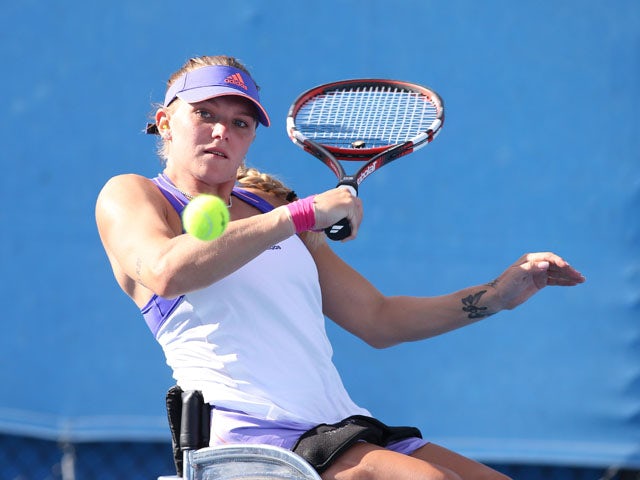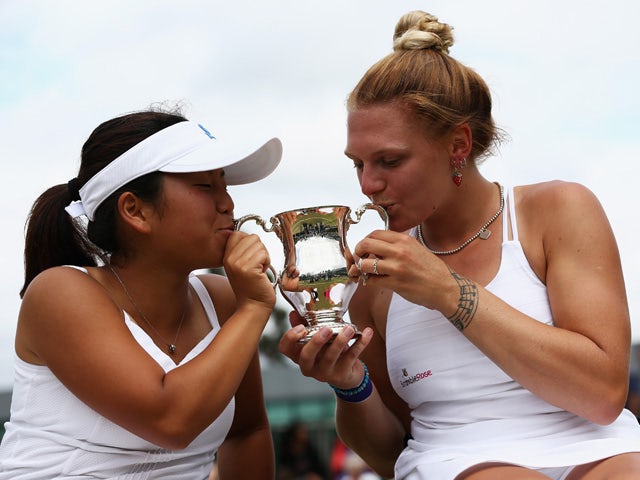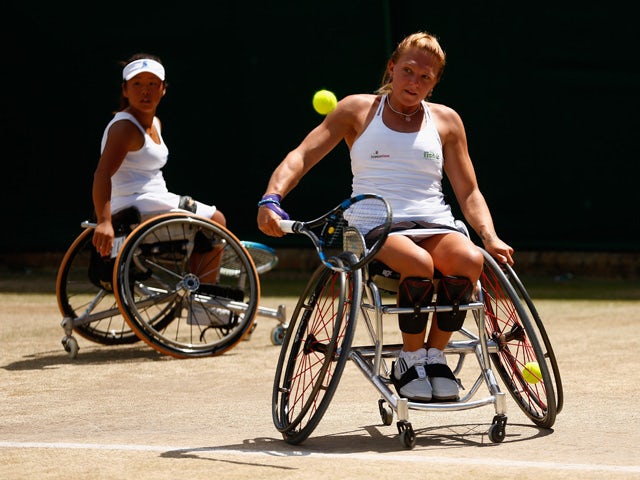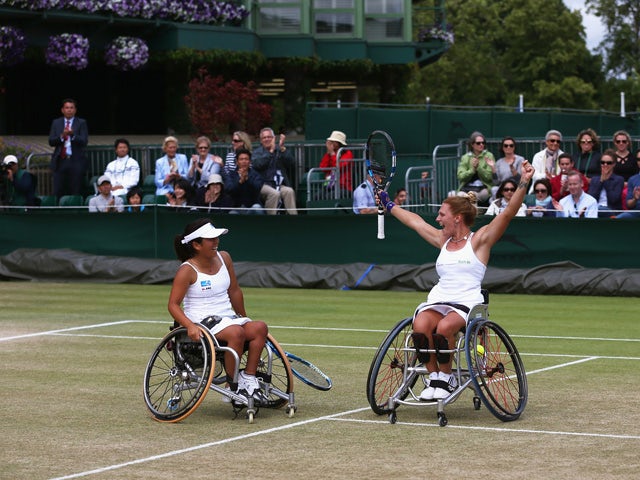While many fell at the first hurdle, Andy Murray lost in the semi-finals and his brother Jamie was beaten in the final of the men's doubles, there was one British tennis player who was celebrating at Wimbledon earlier this month.
In June, The Telegraph described Jordanne Whiley, who was born with brittle bone disease, as "the most successful British tennis player you've never heard of".
However, her triumph alongside Yui Kamiji in the wheelchair doubles - their second in a row at SW19 and sixth Grand Slam title overall - has gone some way to not only boost the 23-year-old's profile, but also the interest in her sport.
Yet, much more is still needed and here, Sports Mole has spoken with Whiley to find out what else needs to change so that people become more aware of disabled sports, as well as having a look ahead to next year's Olympic Games in Rio de Janeiro.
In a video interview earlier this year, you insisted that there "was no such word as can't". Where does that determination come from? Is that something you were born with, or has it built up over the years?
"I don't think I was born with it. Growing up was difficult in school because I was bullied a lot. For me it would have been easy to say 'I can't do that' or 'I'll never be that'. But, as I've got older, gained more life experiences and become successful, I've learned to think that way. I've got quite a high pain barrier - I'm not a moaner or anything like that. I know what real pain is and so I'm pretty level headed."
Why wheelchair tennis? Why pick that over the track or team sports?
"I tried racing and I tried basketball and I was very good at both of them, but I don't tend to work very well in a team, so basketball wasn't really for me. As for racing, I found that quite boring just going round a track all day, every day."
 © Getty Images
© Getty Images
You've been described as 'the most successful British tennis player we haven't heard of'. What needs to change for you to become a household name? Other athletes in lesser known sports believe that success is the key, but you've won six Grand Slam titles now. Why is it different for you?
"You do have to be successful, but there has to be more knowledge around disability sport in general. I guarantee if you went up to 100 people in the street and asked them to name a Paralympian, 10 or 20 would name David Weir and that would be about it. You need to see Paralympic sport on television.
"For us, we want to see wheelchair tennis on the mainstream channels - all Grand Slams. It's not televised anywhere, except Wimbledon and that's on the red button. If you don't have the red button, you can't watch it. I think Wimbledon are trying to do more, but I've not heard anything from any of the other Grand Slams."
In this country are we perhaps still a bit ignorant when it comes to disabled sports?
"As a country we are one of the best, but still there doesn't seem to be too much of a clue. It's to do with the media coverage - it's more of a media issue than a public issue. If the media start putting it on television, start using Paralympians on billboards and promote their products, that would help massively. But, the coverage around Wimbledon for me from the likes of the BBC and Sky was really good."
"We need to be associated with something. Like Usain Bolt, even if you don't know what he does, you know that he is connected to Virgin Media. Little things like that help because right now Paralympians are not really associated with anything."
Improvements are still clearly needed, but did things change for the better after London 2012?
"Majorly. Before London 2012, I probably had around 900 followers on Twitter and no media coverage at all really. I might have been in the local paper every now and then, but that was about it. In the last three years, it's increased. Yes, I've become more successful which has helped, but there's a bigger interest in general as well."
You successfully defended your Wimbledon doubles title alongside Yui Kamiji. How important was that, particularly given the fact that you had lost in the French Open final just a few weeks before?
"Wimbledon is always special for me and Yui. She always feels like she is at home and obviously it is my home. We always want to win Wimbledon over all of the other Grand Slams. For us to come back as defending champions after having a really bad defeat at Roland Garros showed our strength and character. It was something that we really wanted to do."
 © Getty Images
© Getty Images
You and Yui are now world number ones - what is it about you two that sets you apart from the rest?
"We're best friends, which helps. Our rivals are good friends as well, so it can't be just down to that. We have a really good connection. Our game styles are very similar, whereas with our rivals, their playing styles are quite different. Sometimes that can complement each other, but in terms of me and Yui, when you come up against us the tactics can be hard to play against because we are similarly strong."
Earlier you mentioned that you've never worked well in a team, yet you seem to function well with Yui. Why is that?
"I've always been pretty good at doubles, I've just never clicked with someone before. I've also played with people that I don't get on with and that's pretty difficult. But, with Yui and I, it's clicked. There is no awkwardness and no pressure. We're never angry at each other and we know each other inside out. We know how to pick each other up and how to help each other along. It's just a special bond."
Is it hard in doubles to keep your composure with your partner if they are having a particularly bad game?
"Me and Yui are a team, which means we win as a team and lose as a team. If Yui makes a mistake on match point and that ends up losing us the match, it doesn't mean it's her fault because I might have made 20 unforced errors during the game. She might have made just two and that happened to be on match point. When you don't have a good connection with someone, that can be quite difficult and it's easy to pass the blame on then."
The fact that you are world number one in the doubles and world number five in the singles, do you see yourself as a role model?
"I do and it's something that I will embrace, rather than feel pressure. I actually enjoy it. Something I feel quite strongly about is having role models who aren't perfect. I always see that little girls and young women are looking up to the likes of Katie Price or Paris Hilton or whoever it may be. They are usually stick thin, absolutely stunning, massive boobs - all that. But, perfection is an impossible thing to achieve, so why are you trying to achieve it?
"I'm flawed - I was born disabled so I've been flawed since birth. I'm not some Page 3 model, I've got scars all over my legs and I'm four foot nine. But, I'm really successful and people do look up to me. People need someone like that who is real. It reiterates that people can achieve their dreams, no matter what they look like."
 © Getty Images
© Getty Images
It's something that you seem very passionate about. Does that mean being a role model comes easily to you?
"It does, very much so. I've grown up with men - most of my friends are boys and I live with my boyfriend. A lot of lads seem to look at girls in magazines and say 'she's well fit'. Yes, she's good looking, but those photos have often been photo-shopped. I don't like the way those images are portrayed to the public because she doesn't look like that."
How can that be changed? Or is that way of thinking almost too engrained to be altered now?
"It's really, really difficult. If I stood here and said it would be easy to change, I'd be lying. It seems to be a way of life now. The way society is going, it's getting ridiculous. It's all about the bigger it is, the better. It's all about big eyelashes or looking orange. People are going into job interviews thinking they have to look that way to get the job. It's crazy and I don't like it. If I'm the only person that feels this way, I'm going to do everything that I can to influence people to just be real and be themselves."
In a sporting sense, as a role model to other wheelchair tennis players in Britain, how do you rate the standard of the sport in this country?
"We're one of the best countries along with Holland, France and Japan. We've got a really strong team and our men just won the World Cup for the first time ever, which is incredible. We've got juniors coming through as well, so hopefully we are putting wheelchair tennis on the map."
Novak Djokovic will have pocketed around £1m in prize money for winning Wimbledon, whereas you would have received nowhere near that amount. Does that need to change?
"Every year the prize money goes up by something like 20%, which is great, but at the same time people have to respect that we are doing the same amount of tournaments, the same amount of training and putting in the big hours. We are at all the Grand Slams, but are earning pennies in comparison. People will respond to that pointing out that there is only eight people in our draw, which is a fair comment because we are straight into the quarter-finals.
"But, if you turn that around, to put that into perspective, it's like Andy Murray going to a Grand Slam and playing Roger Federer in the first round, then Rafael Nadal next and Novak Djokovic in the final. For us, that's exactly how it is because it's the top eight in the world. You have to maintain your world ranking, which is tough."
 © Getty Images
© Getty Images
How does sponsorship work for yourself? Do you ever have to delve into your own money to pay for transport, training camps etc?
"Sponsorship is really difficult. I receive a lottery grant from UK Sport, which I'm grateful for. I also have some small sponsors and that helps a lot, but I'm currently looking for a major sponsor right now. I have had a lot of interest from different companies and people that want to help, especially at the start of this year after I had won the calender Grand Slam."
There is a few Grand Slam tournaments between now and then, but what are your hopes for Rio 2016? You're no stranger to the Games, so are you confident of winning gold?
"I've played at an away Games and a home one, so I understand the difference between the two. I know the pressures that come with both of them. I have medalled and I'm going to be so experienced for Rio. I've learned how to control my nerves, which boosts my confidence. Going into Rio, I should be able to control my nerves if I get into a medal match. I hope [I can win gold], otherwise I'm going to be very disappointed. I'd like to win gold in the singles and then a silver or gold in the doubles."
What does the future have in store for you?
"It depends on how I do in Rio - that's taking up a lot of my thinking right now. I really want that gold medal round my neck. In the future when I retire, I'd quite like to set up my own charity and write a book. It would be great to keep involved with my sport, but also share my views with others.
What about wheelchair tennis? What would you like to see happen to the sport over the next couple of years?
"I'd like it to be streamed more on television, even if it was just finals day at Wimbledon and the other Slams. The likes of the BBC have the time because on the finals day they only have the men, women and doubles finals. They are always showing highlights or interviews with different people, but actually if you took an hour and half away from that and gave it to wheelchair tennis, you'd get a positive response from the public I'm sure."



